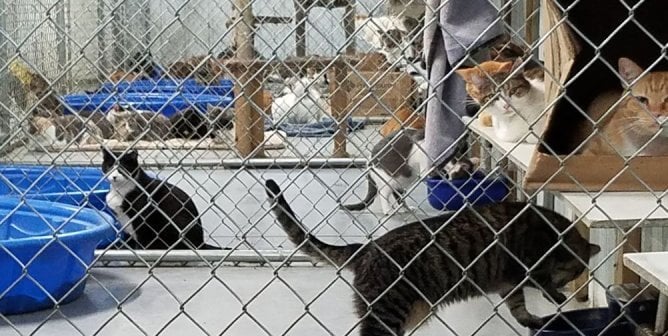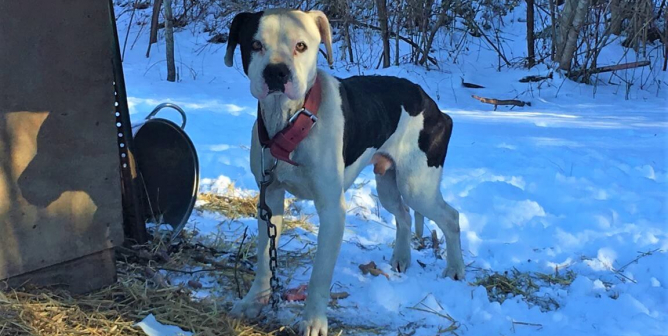Meatless Meals for Dogs and Cats
If you are concerned about your companion animals’ health and about the cruelty of the meat industry, you may want to stop buying meat-based commercial pet food.
Dangerous and Unsupervised Industry
Feeding companion animals commercial pet foods may be jeopardizing their health. Supermarket pet foods are often composed of ground-up parts of animals that U.S. Department of Agriculture inspectors have deemed unfit for human consumption. The U.S. Food and Drug Administration (FDA) defines “meat meal,” a common ingredient in pet food, as “the rendered product from mammal tissues, exclusive of any added blood, hair, horn, hide trimmings, manure, stomach and rumen contents….and parts of animals one would not think of as ‘meat.’”1 The flesh of animals who fall into one of the categories of the four D’s—dead, dying, diseased, or disabled—is what often goes into pet food.2
Most pet foods contain the same hormones, pesticides, and antibiotics that are found in commercial meat products for humans. Other additives can be toxic and go unnoticed until it’s too late. While the pet-food industry falls under the purview of the FDA, they leave it up to The Association of American Feed Control Officials to set standards, but it does not enforce them nor does it conduct any testing of food.3
And just like a human diet of meat negatively impacts the environment, so does feeding meat to our companion animals. One study estimated that U.S. cats and dogs eat 25 percent of all animal-derived calories in the country, rank fifth in global meat-consumption, and could release as much as 64 tons of greenhouse gasses.4
Vegetarian Dogs and Cats
Many vegetarians and vegans feed healthful, meatless diets to their companion animals. One remarkable example is that of Bramble, a border collie whose vegan diet of rice, lentils, and organic vegetables contributed to a nearly record-breaking lifespan of 29 years.5 Many commercial meat-based dog foods can cause health problems in our animal companions.
The nutritional needs of many dogs and cats can be met with a balanced vegan diet and certain supplements. James Peden, author of Vegetarian Cats & Dogs, developed Vegepet™ supplements to add to vegetarian and vegan recipes. They are nutritionally balanced and also come in special formulas for kittens, puppies, and lactating cats and dogs.
Some people wonder if it’s “unnatural” to omit meat from the diet of dogs and cats. But to feed them the meat that they would naturally eat, you would have to serve them whole mice or birds or allow them to hunt for themselves, an option that would be unfair to native species of birds and other small animals, since companion cats and dogs are non-native and have advantages that wild animals lack. Many vegan dogs and cats enjoy excellent health, and a vegan diet for your companion animal is ethically consistent with animal rights philosophy.
Important Supplements
Making vegetarian food for dogs is easy because dogs, like people, are omnivorous and usually hearty eaters. Recipes for vegetarian and vegan dogs are available, but note that if a dog receives too little protein, calcium, or vitamin D, his or her health could be jeopardized.
Dogs require two amino acids, called L-carnitine and taurine, that can be insufficient in plant-based or cooked dog food unless it is supplemented. A deficiency in these nutrients can cause dilated cardiomyopathy, a serious illness in which the heart becomes large and flabby and can no longer function. This illness generally strikes young or middle-aged dogs who are susceptible to L-carnitine or taurine deficiency because of breed, size, individual genetic makeup, or diet. Supplemental L-carnitine and taurine can be bought at your local health food store or online.
Cats’ nutritional requirements are more complicated than those of dogs. They require a considerable amount of vitamin A, which they cannot biosynthesize from carotene, as dogs and humans can—insufficient amounts may cause hearing loss and problems with skin, bones, and intestinal and reproductive systems. And like dogs, cats need taurine and can develop cardiomyopathy without it as well as losing their eyesight. Be sure that any food you feed your cat contains these nutrients. Commercial pet-food companies often add taurine obtained from mollusks. James Peden found vegetarian sources of both taurine and vitamin A, plus arachidonic acid, another essential feline nutrient. He then developed veterinarian-approved supplements Vegecat™ and Vegekit™ to add to his recipes.
Dogs and cats who are eating only cooked or processed food also benefit from the addition of digestive enzymes to their food. These are obtainable through companion animal supply catalogs and health-food stores. Any raw vegetables in a dog’s diet should be grated or put through a food processor to enhance digestibility.
Making the Adjustment
To help with the adjustment to a vegetarian or vegan diet, start by mixing the vegetarian food in with what you usually serve. Gradually change the proportion until there is no meat left. If your efforts are met with resistance, tempt your animal friends by serving it warm or by adding soy milk, nutritional yeast (available at natural-food stores), olive oil, tomato sauce (most dogs love spaghetti!), catnip (for cats), powdered kelp, baby food that doesn’t contain onions, or other seasonings. Many cats like nutritional yeast and pieces of melon, and most love mashed chickpeas and veggie burgers. If your companion animals are addicted to supermarket pet food, it may take a while for them to adapt.
After switching dogs or cats to a vegan diet, monitor them closely to make sure that their new diet agrees with them, especially if they are still puppies or kittens. Watch for chronic gastrointestinal and skin problems, and note any new health problems. Most dogs and cats’ health improves on a vegetarian diet, but occasionally an animal may not thrive, so use common sense if this occurs.
References
1U.S. Food and Drug Administration, “Pet Food Labels-General,” U.S. Department of Health and Human Service, 13 Oct. 2017.
2Dr. Donna Spector, “Pet Food (What You Need to Know) for Your Pet’s Sake,” PETMD.com, accessed 26 Sept. 2018.
3Jackson Landers, “A Dog-Eat-Dog World,” Slate, 19 Apr. 2013.
4Karin Brulliard, “The Hidden Environmental Costs of Dog and Cat Food,” The Washington Post, 4 Aug. 2017.
5Kim Ahora, “Doggedly On A Veggie Diet,” Times of India, 26 Aug. 2010.







